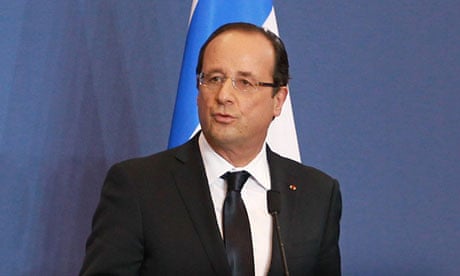When François Hollande became French president in May, he kept his old mobile phone number so old friends could still reach him to give their frank views. The first Socialist party president in 17 years may be regretting that now: six months after the victory street party at Paris's Bastille, where he vowed to save Europe from one-size-fits-all austerity, his popularity is plummeting.
He has now broken the record as the most unpopular French president at the six-month mark of a mandate. Only 36% of French people have confidence in Hollande, according to the latest poll by TNS-Sofres for Le Figaro magazine. By comparison, the rightwing Nicolas Sarkozy had 53% approval ratings six months after his election in 2007.
Why has Mr Normal, an ordinary, decent bloke who pledged to rein in France's huge public deficit while staying fair to the poor and crisis-hit, fallen so far so fast? Hollande's misfortune in the polls follows an autumn of communications gaffes and perceived inaction by a government that has veered off and on message to the point where the public is no longer certain what the message is.
When Sarkozy fell from grace almost a year after taking office, it was because of his personality – he irked the electorate by flaunting his bling lifestyle, and was perceived as being more concerned about his whirlwind romance with Carla Bruni than the struggling French population. But if in early 2008, the public disliked Sarkozy as a person, they didn't mind his policies and politics. Proof was the good popularity ratings of his prime minister François Fillon, who was well liked while putting Sarkozy's plans into practice. Fillon still has high approval ratings as he battles to become the new leader of Sarkozy's UMP party.
By contrast, Hollande's opinion poll nose-dive is not about personal animosity – he has kept up his image as a modest president – it's his politics, specifically his way of doing politics, which is under attack. The Socialist leadership and government is seen as confused, accused by its opponents of amateurism and inaction. Even the leftwing daily Libération recently dubbed Hollande and his prime minister Jean-Marc Ayrault "The Apprentices".
Ayrault, a former teacher who used to drive a VW campervan, was well liked at the start. Yet he has sunk even further than Hollande, to 34% approval ratings. A series of gaffes haven't helped – notably when he suggested this week that he was open to debating the future of the Socialists' cherished 35-hour week before hastily contradicting himself under pressure from the Elysée. Or when the government tweaked a planned increase in capital gains taxes after a revolt from young entrepreneurs calling themselves "The Pigeons" (slang for mug or sucker).
All this created a public perception that the government thought problems needed to be solved, but wasn't sure which ones, or how to do it.
Hollande and Ayrault are pushing through France's harshest budget for 30 years – and despite telling voters that nine out of 10 of them wouldn't feel the pinch of higher taxes aimed mostly at the rich and big business, public opinion clearly does fear it will feel the pain.
Hollande is forced to respect EU demands to cut the French deficit. But he must also persuade voters he has his own ideas. The old cliche of France being a country impossible to reform has given way to a searching quest for real structural solutions to rising unemployment, dying industry, low competitiveness, stuttering growth and the threat of recession.
Hollande favours slow, gradual "negotiation" in contrast to what he calls the "brutality" and headline-grabbing of the Sarkozy era. He has said there will be no "shock treatment" for Paris's uncompetitive economy, despite an impatient Germany fearing France is the next sick man of Europe, but instead a slow, five-year-long approach. But his consensual approach has been construed in the public eye as inaction. To the point where Le Monde asked in a headline this week: "Has Hollande underestimated the crisis?"
Hollande stood firm in Le Monde, saying he was acutely aware of the trouble facing France and was confident that there would be an economic up-turn. "To exercise power nowadays is very hard. There is no longer any leniency, any respect. But I knew that," he said.
